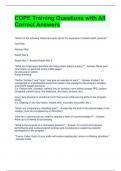COPE Training Questions with All
Correct Answers
*Which of the following historical events led to the expansion of allied health careers?*
Cold War
Vietnam War
World War II
World War I - Answer-World War II
*What are three ways Scholars can help protect patient privacy?* - Answer-Never post
information on personal social media pages
No pictures or videos
Avoid 'friending'
*Define "incident" and "injury" and give an example of each.* - Answer-Incident: An
unexpected or unanticipated event that needs to be reported to the program facilities
and COPE Health Solutions
(i.e. Patient falls, a breach, walking into an isolation room without proper PPE, patient
complaint, patient injury, like bedsores, skin tears, bruises, etc.)
Injury: Any physical or emotional harm that occurs while serving shifts in the program
facility
(i.e. Slipping on the floor/stairs, needle stick, traumatic encounter, etc.)
*When are competency checklists due?* - Answer-By the end of the second week of the
rotation; must be completed by an RN ONLY
*How far in advance do you need to request a letter of recommendation?* - Answer-
Allow up to 8 weeks for processing
*What is the purpose of a counseling session?* - Answer-To correct and improve
performance and review program policies and procedures to support successful
participation in the program
*True or False: Each of your shifts will involve spectacular, once-in-a-lifetime situations.*
- Answer-False
,*True or False: A program participant can perform a task outside of their scope of
practice as long as they get direct approval/training from a staff member.* - Answer-
False
*Health Scholars are responsible for establishing and maintaining professional
boundaries with other scholars, volunteers, staff and patients. In order to accomplish
this Health Scholars should do all of the following, EXCEPT:*
Always assess potential implications of your actions/words - if you ever have a question
as to what's appropriate, ask a supervisor
Be genuine and mindful
Ask yourself: "Will my actions/words detract from the care plan?"
Break confidentiality - Answer-Break confidentiality
*What is active listening?*
Walking and talking together.
Hearing and listening to what the person said, pausing to understand it before
responding.
Talking over someone because your ideas are more important. - Answer-Hearing and
listening to what the person said, pausing to understand it before responding.
*True or False: Scholars can provide advice on discharge instructions, prescriptions,
and how the patient should manage their pain.* - Answer-False
*What are the five aspects of communication?*
Feeling, thinking, understanding, wondering, remembering
Walking, running, pacing, sprinting, laughing
Gestures, facial expressions, touch, degree of formality, pace - Answer-Gestures, facial
expressions, touch, degree of formality, pace
*True or False: Sympathy and empathy are the same thing.* - Answer-False
*Select the one that is NOT a patient identifier:*
Asking the patient's visitors what relation they have to the patient
Open ended question
, Patient's chart
Nurse Station/ Room Whiteboard
Patient's wrist band
Patient's nurse - Answer-Asking the patient's visitors what relation they have to the
patient
*HCAHPS stands for:*
Hospital Checks and Healthy Patient Satisfaction
Healthy Communication and Happy People Smiling
Hospital Consumer Assessment of Healthcare Providers and Systems
None of the answers are correct - Answer-Hospital Consumer Assessment of
Healthcare Providers and Systems
*Of the 11 HCAHPS measures, scholars can directly impact:*
Cleanliness and Quietness: Being vigilant about keeping a patient's room uncluttered
and helping control noise levels, especially near patient rooms
Responsiveness of Hospital Staff: Answering call lights and rounding on patients to
anticipate needs
Both of these answers
Neither of these answers - Answer-Both of these answers
*AIDET is:*
Ask, Introduce, Dismiss, Empathy, Thoughtfulness
Acknowledge, Introduce, Duration, Explain, Thank
Assess, Inquire, Discuss, Email, Thank - Answer-Acknowledge, Introduce, Duration,
Explain, Thank
*When reading a co-worker's Facebook page, you see that they have taken a picture of
a patient's unusual injury with their cell phone and posted it online, but the patient's
name is not mentioned.*




